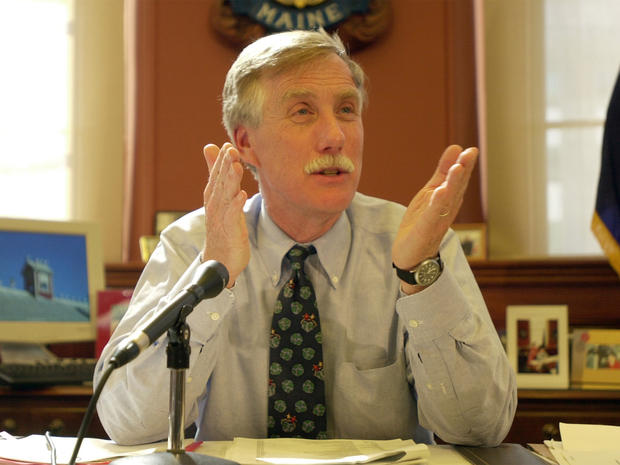Angus King's mission to bridge the aisle in Congress
(CBS News) BRUNSWICK, Maine - Without being a member either major political party, Angus King is confident he can be a broker for common sense and ending gridlock in Washington when he takes his seat in January as the new U.S. Senator from Maine.
"The people are absolutely fed up with this nonsense. They have had it with Washington not being able to get anything done," King said in an interview in his home in Brunswick, a 30-minute drive north of Portland.
Reforming the Senate itself was at the core of his campaign this year, which King won as an Independent with 53 percent of the vote over Republican and Democratic candidates.
"People would come up to me on the street -- 'Why the hell can't they talk to each other, why can't they make decisions, why can't they compromise?'"
Angus King to caucus with Democrats
Dickerson: Is this the beginning of progress?
Democrats hold onto Senate majority; GOP keeps control of House
For starters, King wants to curb the frequent filibusters that allow a minority of senators to block so much legislation, because of a rule requiring 60 votes to cut off debate.
"Nowhere is that in the Constitution," King said. "I think there might be some fixes, one of which might be, for example, requiring people to actually go on the floor and talk."
King also wants to require full transparency in campaign contributions. This year, in the seven of the ten most expensive Senate races, outside groups spent more than candidates themselves. King was hit by $6 million in attack ads.
"It was no fun, and it's particularly, I think, a problem for our system when it's anonymous -- when you don't know where the money is coming from," King said.
Overall, $300 million of $1.3 billion in outside spending on the presidential and congressional races came from groups that are not legally required to disclose their donors, according to the Sunlight Foundation. King would reintroduce the bill that sought to change that, which died in a filibuster last year.
King, 68, learned the value of being an Independent during his two terms as governor, from 1995 to 2003.
He said, "I don't have to check with anybody about what my positions are. I can call them as I see them. That's what I did for eight years as governor. There was one glorious six week period where I had both parties picketing my office."
For now, King has decided to caucus with Democrats, because they hold the Senate majority, with 53 seats. Including King and liberal Vermont Senator Bernie Sanders, also an Independent, the Democrats effectively control 55 seats.
Without choosing a party to caucus with, King and Sanders would not get assignments on committees where legislation is crafted.
"I want to be an independent as I can be, but I also want to be an effective senator," King said, adding that he plans on working with Republicans.
King describes himself as socially liberal and fiscally conservative. He supports abortion rights and backed the Maine referendum which legalized gay marriage. He wants President Obama's health care reform fully implemented to cover the uninsured.
An advocate for developing alternative energy sources like wind and solar power, King wants Congress to address global climate change. On his iPhone, he stores a chart from the National Oceanic and Atmospheric Administration showing carbon dioxide emissions soaring since the mid-1800s.
"Is something happening? Yes. Are humans causing it? Yes," King said. "All of the fossil fuels are going to run out eventually, whether it's 10, 20, 50, 100, 200 years. Shouldn't we be beginning the process of figuring out how to get the power that we need now?"
Still, King considers reducing the $1 trillion annual federal budget deficit a more urgent priority.
"We're digging holes very fast, and the first rule of getting out of holes is to stop digging," King said. "I think the economy is sort of waiting. This deficit is a dark cloud over everything."
King believes for every two or three dollars in federal government spending cuts, there ought to be a dollar in new revenue, in line with the formula touted by the Simpson-Bowles Commission.
King considers an impediment the no new taxes pledge pushed by Grover Norquist's Americans For Tax Reform and signed by 39 incoming senators and 219 representatives in the House, according to ATR's website.
"To me, it's like going to Washington with one hand tied behind your back." King said. "I mean nobody wants to raise taxes, but nobody wants to pass on a huge bill to our grandchildren."
There's a long history of Maine senators who worked from the moderate middle to shape significant bipartisan bills, among them Wallace White, Margaret Chase Smith, Edmund Muskie, George Mitchell, William Cohen, Susan Collins, and the senator King is replacing, Olympia Snowe.
"It's in the water," King said.
Snow recently said on "Face The Nation" there is a big difference between compromise and capitulation on one's principles.
"I completely agree," King said. "There are certain principles you don't want to compromise on, but compromise is the essence of the human condition. My wife and I compromise five times a day."
King draws inspiration from Civil War hero Joshua Lawrence Chamberlain, whose daring leadership of a Maine regiment helped the Union Army win the pivotal Battle of Gettysburg.
Chamberlain once lived on King's street, where his house is now a museum and a statue stands nearby.
In 2013, King said, he hopes he can be a bridge between the nation's two warring political parties.
"I like the image of a bridge," King said. "A guy came up to me during the campaign, and he said, 'I know what you are trying to do.' I said, 'Oh, tell me.' He said, 'You want to be the first pole in a new tent.' I kind of like that."

